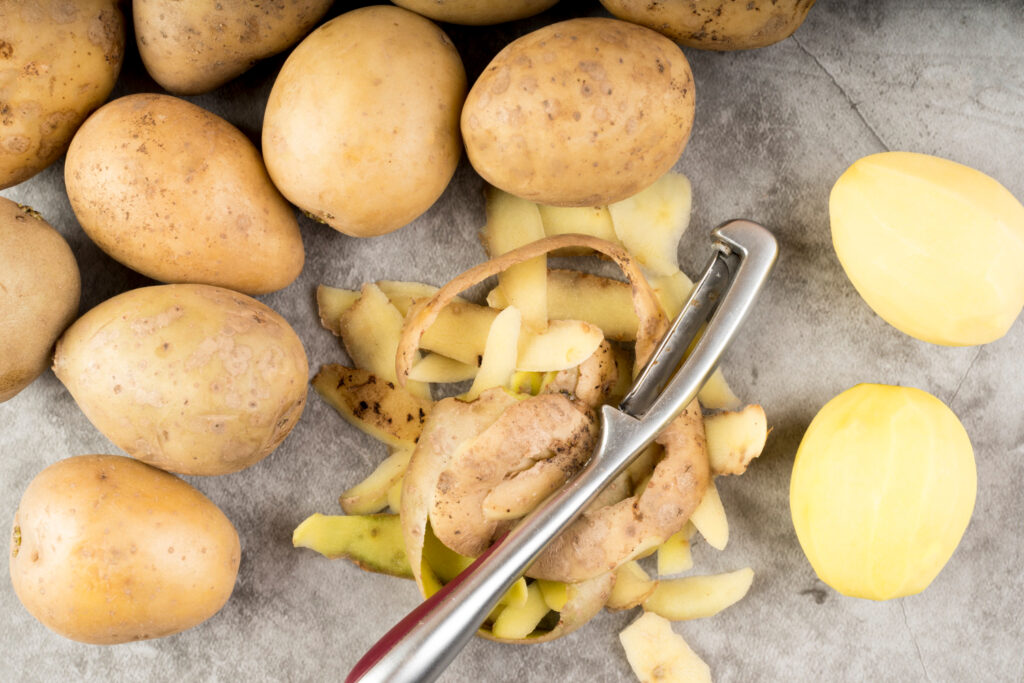
Fast Facts
Americans consumed an average of 49.4 pounds of potatoes per person in 2019
Potatoes are high in carbohydrates but low in protein and fat
Baking, roasting, and steaming are healthier ways to prepare potatoes
Sweet potatoes provide more fiber and vitamin A compared to white potatoes.
Potatoes are a staple in the American diet, with the average person consuming 49.4 pounds annually in 2019, according to the U.S. Department of Agriculture. While potatoes are rich in vitamins, minerals, and fiber, consuming them in excess, especially when fried or topped with unhealthy ingredients, can have negative health effects.
This article explores the potential health risks of eating too many potatoes, how to prepare them in healthier ways, and tips for balancing your diet with other nutritious carbs and vegetables.
How Many Potatoes Should You Eat Each Week?
Potatoes are categorized as starchy vegetables, alongside corn, jicama, and yams. These vegetables are excellent sources of carbohydrates, fiber, vitamins, and minerals, contributing to a feeling of fullness after meals.
The Dietary Guidelines for Americans recommend that adults consume 4 to 6 cups of starchy vegetables per week, based on a diet of 1,600 to 2,400 calories. Adjustments may be necessary depending on your caloric needs.
However, starchy vegetables should be just one component of a balanced diet that includes leafy greens, fruits, whole grains, lean proteins, and healthy fats. Each food group provides unique nutrients and health benefits, making variety essential for overall health and reducing the risk of chronic diseases.
Nutrition of Potatoes

A 100-gram (3.5-ounce) serving of plain baked white potatoes with the skin provides:
- Calories: 92
- Carbohydrates: 21.1 grams (g)
- Fiber: 2.1 g
- Protein: 2.1 g
- Fat: 0.15 g
- Potassium: 544 milligrams (mg) (12% of the Daily Value or DV)
- Copper: 0.127 mg (14% DV)
- Vitamin C: 12.6 mg (14% DV)
- Vitamin B6: 0.211 mg (12% DV)
- Folate: 38 micrograms (mcg) (9.5% DV)
Potatoes are high in carbohydrates but low in protein and fat. They offer a variety of vitamins and minerals crucial for energy, muscle function, heart health, and immune support. Notably, potatoes contain resistant starch, which promotes gut health and can help regulate blood sugar levels. Cooking and then cooling potatoes increases their resistant starch content.
Potential Side Effects of Eating Too Many Potatoes
Higher Blood Sugar
Due to their high carbohydrate content, consuming large amounts of potatoes can raise blood sugar levels, particularly in people with diabetes or insulin resistance. The American Diabetes Association (ADA) recommends filling a quarter of your plate with starchy vegetables like potatoes, half with non-starchy vegetables, and the remaining quarter with a protein source to help manage blood sugar levels.
Weight Gain
Potatoes, especially when fried or topped with high-calorie ingredients like butter and sour cream, can contribute to weight gain. Fried foods, such as French fries, are calorie-dense because of the oil used in frying. For example, a 3.5-ounce serving of plain baked potatoes has 92 calories, while the same amount of French fries contains 289 calories and 14 grams of fat. Health experts advise limiting fried food intake and being mindful of portion sizes and toppings when consuming potatoes.
Higher Blood Pressure

Eating four or more servings of boiled, baked, mashed, or fried potatoes per week has been linked to an increased risk of high blood pressure. This may be due to the high carbohydrate content and the effect on blood sugar, as well as the added salt and fat in many potato dishes. However, some limitations in the study, such as self-reported hypertension, should be noted.
Digestive Issues
Overeating potatoes, particularly when combined with high-fat ingredients, can lead to digestive discomfort, bloating, and gas. Moderating potato intake and choosing healthier preparation methods can help avoid these issues.
Is There a Better Way to Eat Potatoes?
Healthier cooking methods for potatoes include baking, roasting, and steaming, which avoid adding unhealthy fats and excess calories.
- Baked Potatoes: Preheat the oven to 400 degrees Fahrenheit and bake for 45-60 minutes until fork-tender. Top with nutritious options like salsa, plain yogurt, or avocado, and add herbs like parsley and chives for flavor.
- Roasted Potatoes: Preheat the oven to 400 degrees Fahrenheit, toss potatoes with olive oil, salt, and pepper, and roast for 20-30 minutes until golden brown and crispy.
- Steamed Potatoes: Place potatoes in a steamer basket over boiling water and steam for 10-15 minutes until tender.
To increase resistant starch content, try making a potato salad with light mayo or plain Greek yogurt and adding herbs and chopped vegetables. Sweet potatoes are a particularly nutrient-rich variety, offering more fiber and vitamin A than white potatoes. They can be baked, roasted, or mashed, and used in soups and stews for added sweetness.
What to Eat Instead of Potatoes
While potatoes are nutritious, diversifying your diet with other nutrient-dense foods can provide a broader range of health benefits:
- Whole Grains: Brown rice, quinoa, oats, and whole-wheat products offer fiber, complex carbohydrates, and essential minerals like iron and magnesium.
- Legumes: Beans, lentils, and peas provide protein, fiber, and nutrients like B vitamins and zinc. They can be added to soups, stews, and salads.
- Non-Starchy Vegetables: Leafy greens, tomatoes, bell peppers, and carrots are low in calories but high in fiber and vitamins A, C, and K.
Potatoes can be a healthy part of your diet when consumed in moderation and prepared using healthier methods. Balancing your intake of potatoes with other nutritious foods ensures a varied and nutrient-rich diet, supporting overall health and reducing the risk of chronic diseases.











